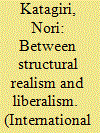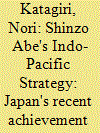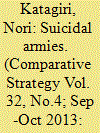|
|
|
Sort Order |
|
|
|
Items / Page
|
|
|
|
|
|
|
| Srl | Item |
| 1 |
ID:
162653


|
|
|
|
|
| Summary/Abstract |
In this article, I argue that Japan's threat perception has evolved in response to the balance of power and perceived intent. Russia, North Korea, and China are all nuclear powers with sizable conventional forces, but the level of threat varies over time, with Japan's response pattern changing from Russia to North Korea to China in recent years. Japan remains a quiet member of the war on terror, but it faces little direct threat from global terrorism and groups like al Qaeda and the Islamic State. Japan's threat response is unique; it skews toward weapons acquisition and enhanced logistics, limiting to a minimum constitutional reform and changes in national security institutions. The well-known antimilitarist norm of the postwar era may be eroding, but it still puts a heavy brake on many “revisionist” projects, including constitutional amendment of Article 9. As a result, Japan's response to the threats has been modest, doing little to prevent China's rise, while growing more dependent on the United States.
|
|
|
|
|
|
|
|
|
|
|
|
|
|
|
|
| 2 |
ID:
170416


|
|
|
|
|
| Summary/Abstract |
While the Obama administration’s Asia rebalance strategy received some praise from scholars and practitioners, it generated three problems that caused the USA to overlook many opportunities and neglect vital concerns. First, the strategy left Asia less stable by undermining US relations with China and smaller states in Southeast Asia. Secondly, it weakened America’s influence outside Asia by committing fewer resources. Finally, the rebalance was executed out of a relatively small cadre of government officials, allowing primarily civilian agencies to dictate Asia policy and excluding key branches of government. Furthermore, although the strategy competed with the strategies of restraint and offshore balancing, it never had the solid support of any international relations theories, leaving few scholars to directly associate it with a theory. Ultimately, the rebalance’s multiple logics prevented it from achieving intellectual hegemony in the American foreign policy discourse, and its substantive flaws and theoretical inconsistencies made difficult its acceptance as an enduring strategy in the Asia-Pacific region.
|
|
|
|
|
|
|
|
|
|
|
|
|
|
|
|
| 3 |
ID:
182420


|
|
|
|
|
| Summary/Abstract |
I investigate reasons why Japan does not use “active-defense” cyber strategy for the purpose of cyberspace deterrence. I show that the reason has much to do with the passive nature of cyber strategy best characterized as “denial defense,” a strategic posture designed to deny attacks by defensive methods. I offer three reasons for this strategic choice. The first is the way the law works in Japan. The legal system, including the constitution, is the cornerstone of passive defense. All the reforms made in recent years to buttress Japan’s cyber policy have been within the existing legal framework. The second reason is the enormous technical constraints that Japan face on the use of cyber force. The final reason has much to do with the difficulty of sending credible threats to target audiences, reassuring the public , and controlling cyberspace escalation.
|
|
|
|
|
|
|
|
|
|
|
|
|
|
|
|
| 4 |
ID:
167182


|
|
|
|
|
| Summary/Abstract |
I examine the relationship between organizational stability, lethality, and target selection, and attack method of Southeast Asian insurgency. I do so by comparing the Abu Sayyaf Group (ASG) and Jemaah Islamiyah (JI), using data of their activities between 1994 and 2015. I make two arguments. First, organizationally unstable insurgency groups tend to see their members increase generate more casualties, while stable groups often experience reduction of violence. Second, organizational instability makes it more likely for groups to target civilian populations and business infrastructure than government, military and police forces, and transportation buildings. In contrast, organizational stability has limited explanatory power on its attack methods.
|
|
|
|
|
|
|
|
|
|
|
|
|
|
|
|
| 5 |
ID:
173694


|
|
|
|
|
| Summary/Abstract |
I use IR theories to investigate Japanese foreign policy between 2012 and 2017. I make two arguments. First, I argue that the best theoretical combination to explain Japanese foreign policy under Abe is one of defensive realism and liberalism, with focus on the economic aspects of regional partnerships. Japan has followed a traditional realist approach in security policy, but he has adopted a more activist and broader economic vision in his approach. Second, this analysis reflects Japan’s expansive search of strategic allies in Southeast Asia and beyond; behind the security rivalry and economic partnership with China is the emergence of a geographically wider security architecture coupled with robust economic networks in Southeast Asia and South Asia. In effect, the Abe government has increased ties with India through trade and investment, and reinvigorated the existing diplomatic effort with Southeast and South Asia in a comprehensive package of security and economic initiative.
|
|
|
|
|
|
|
|
|
|
|
|
|
|
|
|
| 6 |
ID:
143697


|
|
|
|
|
| Summary/Abstract |
Given several possible strategic scenarios for East Asia, I argue that the region is likely to be divided by China’s growing power and the American presence along with its allies. The bipolar system in Asia will be relatively stable, however, because of conventional military balance, nuclear deterrence, and economic interdependence.
|
|
|
|
|
|
|
|
|
|
|
|
|
|
|
|
| 7 |
ID:
123440


|
|
|
|
|
| Publication |
2013.
|
| Summary/Abstract |
Why do rebel groups often fight like an army despite the fact that they keep losing most of the time? I examine seven possible answers and find that insurgent forces are likely to use conventional war strategy and be "suicidal" when they receive material aid from outsiders to build up armed forces and fight on terrain that supports large movements, without knowing that such a strategy does not always work, while strong states make interventions to impose their own method of fighting. This finding has important implications for the analysis of asymmetric war, counterinsurgency, and international security.
|
|
|
|
|
|
|
|
|
|
|
|
|
|
|
|
| 8 |
ID:
103970


|
|
|
|
|
| Publication |
2011.
|
| Summary/Abstract |
The strategy of 'winning hearts and minds' is considered key to successful counterinsurgency, but it often works at the expense of political control over the course of war. This happens when the strategy requires the counterinsurgent to work with a local nationalist group that takes advantage of its lack of access to civilians. This exposes the counterinsurgent to a dilemma inherent in the strategy; because working with the group is a crucial part of the strategy, victory would be impossible without it. Yet when the strategy is implemented through the group, it compromises the policy it serves. I show how this dilemma undermined British political control during the Malayan Emergency.
|
|
|
|
|
|
|
|
|
|
|
|
|
|
|
|
|
|
|
|
|